How Comedy Works
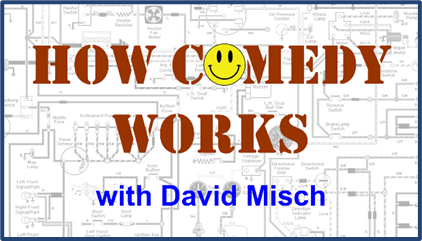
Upcoming (virtual)
Sept. 27: London’s Raindance Film Festival; 4-7:30 GMT, tickets ~$35 (depending on exchange rate).
Oct. 18: Writers and Publishers Network; 10 AM-1 PM PST; tickets available Summer.
Recent sellouts
Austin Film Festival, Writers Guild Foundation, The Second City
David Misch (“Mork & Mindy,” “Saturday Night Live,” “The Muppets Take Manhattan,” “Funny: The Book”) presents a three-hour multimedia seminar which is guaranteed to impart no usable skills.
Okay, that could be an exaggeration but David’s given the same guarantee at movie studios like Sony, DreamWorks, Lucasfilm and Disney, as well as the Austin Film Festival, Actors Studio, Second City and the Groundlings, Yale, Columbia and Oxford Universities, American Film Institute, Raindance Film Festival (London), Trinity College Dublin, VIEW Cinema Conference (Torino, Italy), CineStudio Paris, University of Malta, University of Sydney, and the Burbank Comedy Festival.
HOW COMEDY WORKS has no direct instruction but is a critical, and serious (though
funny) exploration of comedy as an art form, which gives actors, writers, directors, produc-
ers and Crafts Service personnel a closeup of comedy’s innards, the idea being that under-
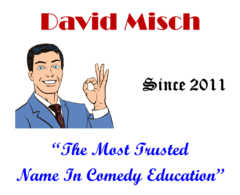 standing how comedy works will help you work in comedy. Anyway, that’s my story and I’m
standing how comedy works will help you work in comedy. Anyway, that’s my story and I’m
sticking to it.
Topics include the Rule of 3 (Why are things funnier in threes? Really, why? I mean,
why?); the relationship between Comedy and Logic (spoiler alert: they’re bitter enemies);
the calculations involved in timing; comedy cues, and why withholding them is sometimes
the best way to get a laugh; why your body is hilarious; the evil of punchlines, and how
the mechanics of jokes – tension and resolution, pattern disruption, misdirection and sur-
prise – provide a template for all humor.
As for practical applications, the presentation includes copious comedy clips, from Buster Keaton to Monty Python to Bo Burnham, which show how these principles translate into actual laughter. So forget that stuff about no usable skills.
Download the above description and/or David’s CV.
Also available: “The Art & Craft of Comedy,” which includes “How
Comedy Works” as part of one 7-hour or two 3½-hour presentations.
SATISFIED AND/OR PAID-OFF CUSTOMERS
(Student evaluations at bottom; more venue responses on Speaker Page.)
“David’s seminar was not only informative but tremendously entertaining.” – Elliot Grove; Founder, Raindance Film Festival (London), British Independent Film Awards
“David did a top-notch job sharing his expertise on comedy. The students truly enjoyed the presentation and it was great to have him with us.” – Lyn Pusztasi, The Second City
“It takes a serious mind to analyze comedy. It takes a funny mind to appreciate it. David Misch is of two minds.” – Jason Alexander
“We laughed until our stomachs hurt, our notepads filled and our comedy elevated.” – Caleb McKnight, Austin Film Festival
“David’s illumination of the foundations of comedy is wonderful and inspiring.” – Patricia Meyer, American Film Institute
“A sell-out crowd, lots of laughing and learning about why and how comedy works; both grad students and faculty got a lot from the evening.” – Alan Kingsberg, Columbia University
“David shows how, why and when comedy works, and connects laughter to our nervous awareness of our own mortality. He had the audience howling with laughter, and howling for more.” – Glenn Entis, VIEW Cinema Conference (Torino, Italy)
“Superb; entertaining, informative and witty.” – Gloria Lauri Lucente, University of Malta
“David Misch is one funny motherfu**ker.” – Penn Jillette
VENUES INCLUDE…
Disney, Sony, DreamWorks, Lucasfilm, American Film Institute, Austin Film Festival, Raindance
Film Festival (London), Oxford University, CineStudio Paris, University of Sydney, VIEW Cinema
Conference (Torino, Italy), Trinity College Dublin, Second City, The Groundlings, The Magic
Castle, The Actors Studio, Writers Guild Foundation, San Miguel Writers Conference (Mexico)
“FUNNY: THE BOOK / Everything You Always Wanted To Know About Comedy”
is in the collections of the New York, Los Angeles, Chicago, Boston and Philadelphia
Public Libraries, and is required or suggested reading at a number of colleges, including:
University of Southern California, UCLA, Fordham, Pepperdine, California State University
Fullerton, and Art Center College of Design (Cal.), University of Sydney (Australia)
and the University of York (England).
To learn more about HOW COMEDY WORKS, David sat down for a some-
holds-barred interview with himself. (Originally published in Script Magazine.)
Hello, David – nice to meet me.
Your pleasure is all mine.
But enough of this gay banter. I understand that tremendous pressure has convinced you to present your multimedia seminar “How Comedy Works” to the general public.
I don’t want to talk about it. The relentless phone calls, the social media trolling, the skywriting… it was incessant, brutal, dehumanizing. Do people think I’m some sort of brilliant comedy-explaining cyborg? I’m a human being, dammit! (Pardon my French.) Stop staring at my brain, my eyes are down here!
Didn’t you just say you don’t want to talk about it?
No. And there’s no way to check. (WARNING! IF YOU LOOK AT THE PREVIOUS PARAGRAPH YOU WILL DIE A HIDEOUS INSTANTANEOUS DEATH!)
Doesn’t explaining comedy kill it?
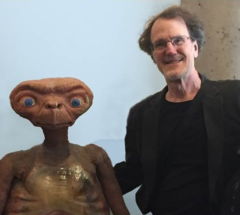
Conferring with an executive at Lucasfilm
People say that, don’t they. But they don’t explain how explaining a joke kills a joke that’s already killed. Timing, right? Don’t explain a joke before telling it.
But who does that? And how does examining a punchline create a Titter Terminator who goes back six minutes in time to kill your laugh?
The idea behind “How Comedy Works” (not to mention “Funny: The Book” which, as long as you bring it up, is available at fine bookstores everywhere – okay, somewhere – I assume – as well as Ye Olde Internette, in print and e-book) is that people study art, history, art history, history of art history, but for some reason comedy’s off-limits.
Why should humor be the one art form that suffers from analysis? Doesn’t it make sense that knowing how comedy works will help you do it better? Everyone who disagrees with me, raise your hand.
I see no hands so I’m clearly right.
Okay, so explain comedy.
Sure! The secret to comedy is — hey, wait a minute, are you trying to get me to tell you for free? Damn, that almost worked, I was this close. (I’m holding two fingers next to each other.)
I’ll give this much away; all comedy uses the same principles: tension and resolution, pattern disruption, misdirection and surprise.
Of course, those are the principles of every art form. But the specifics of comedy are unique, and the precision it requires is – at least to non-professionals – often unrecognized. In most dramas, changing a few words won’t have a huge effect. But in comedy, changing a word, even a syllable, can mean the difference between laughter and reactions ranging from hostile silence to physical violence. (Yes, once I was a stand-up.)
You say there are comedy rules but aren’t rules made to be broken?
No, rules are made to be followed.
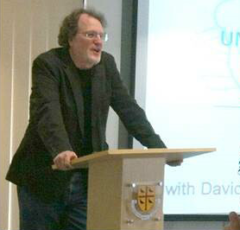
Oxford University
I’m just saying.
Of course no one gets anywhere by blindly following rules. Still, few people get anywhere by ignoring them. The idea is to learn the rules, then master them, then break them, or at least defy them by getting your laughs in unusual ways.
All the top comedy people know the rules, if only unconsciously. And there are only two ways to learn them: lots of work, or getting told. The Rule of 3 didn’t spring fully formed from a nutty Neanderthal’s test beaker (bet you didn’t know cavemen had lab equipment) but from the success and failure of a thousand thousand writers and stand-ups and drunk uncles at Thanksgiving dinners. Everyone who works in comedy rediscovers these rules; this seminar gives you a leg up.
And speaking of discovering what’s already been discovered, my first
(Skippable but directly relevant, mildly amusing anecdote follows.)
writing job was “Mork and Mindy,” and getting an episode on the air was torment; I struggled for days, weeks, trying to think of a story that wasn’t too weird or too familiar.
Finally I got one. I pitched it to the producers and writing staff… and they liked it! I was thrilled. As I left the room, I turned to another writer, an older guy who’d written for “All In The Family” and many other series. “I’m so relieved,” I said. “I was afraid you guys thought my story wouldn’t work.”
“Oh we know it’ll work,” he assured me. “It worked on ‘Newhart,’ it worked on ‘Taxi,’ it worked on ‘Cheers’…”
(End anecdote.)
Once you’ve learned the rules of comedy you have more creative resources, because if you know how something works you can adjust the formula and get laughs in a way that doesn’t simply mimic the work of others but is an expression of your own personality and talent.
Your seminar is about comedy itself, not acting or screenwriting.
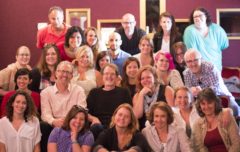
Stephens College MBA Screenwriters
Please put that in the form of a question.
Your seminar is about comedy itself, not acting or screenwriting?
Yes, but the principles I cover also apply to acting, writing, directing; features, sketches, one-liners; foreign policy and real estate investments. (Note: Two of those are a lie.) They all drink from the same comedy trough (a poetic if unappetizing metaphor) in that all human beings laugh, in any situation, for the same basic reasons. Discovering those reasons is the key to making them laugh until they have heart attacks. Which, as we know, is the goal of all comedy.
No offense, but is this class just hours of you blabbing?
I do take offense. “Blabbing”? I’ll have you know that I carefully vary my vocal timbre and have an extremely animated face, powered by Pixar® technology, so that the seminar is guaranteed [Note: There is no guarantee] to keep you on the edge of your seat, especially if you’re so fat that you’re on the verge of falling off anyway. No offense.
But seriously…
While the seminar contains no direct instruction, the principles covered are illustrated with a captivating cornucopia of comedy clips, showing how said principles work outside the lab. Many of these clips are extremely piquant. Droll. Diverting. How you say in this country? Funny.
I understand that as part of this seminar you analyze jokes. I, sir, am a serious student whose comic conun-
drums spring from surprising stories and carefully conceived characters. I do not, sir, I do not stoop to stupid jokes; surely there is no reason for me to analyze them.
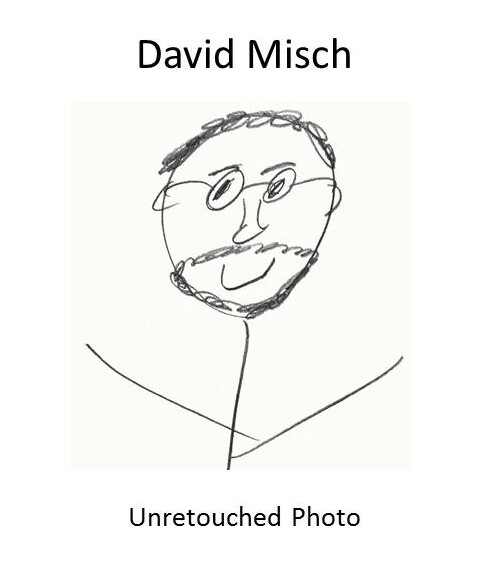
There is, and don’t call me Shirley. (Did I mention I worked with Zucker-Abrahams-Zucker on “Police Squad!,” the TV show that came after “Airplane!” and led to the “Naked Gun” movies? ’Cause I did.)
I like to call jokes “comedy in miniature.” (I like to call my cat “No! Not on the rug!” but that tends to be situational.) Seen in a certain way – the way I see it – the structure of jokes mimics the structure of everything from a sketch to a sitcom to a feature to a novel. The big difference is they’re small, which makes them easier to pull apart, to see what makes them tick. Which helps you see how comedy ticks. Which helps you make it. Which is why explaining it is valuable. Which brings us back to the beginning…
Doesn’t explaining comedy kill it?
No.
~~~~~~~~~~~~~~~~~~~~~
The Groundlings Theatre (Hollywood; master class)
“Brilliant.”
“Amazing breakdown of the mechanics of comedy.”
where the boundaries are, and where to go looking to
learn more; this class is time and money well spent.”
with the well-planned film clips, an intense experience.”
inclusion of historical and literary references. Such a great class!”
David & Raindance, for this insight into the workings of comedy.”

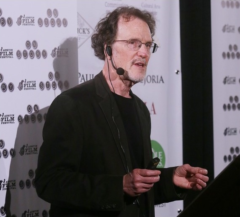 Austin Film Festival
Austin Film Festival